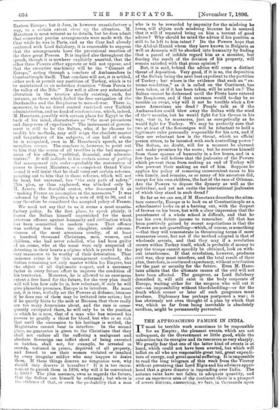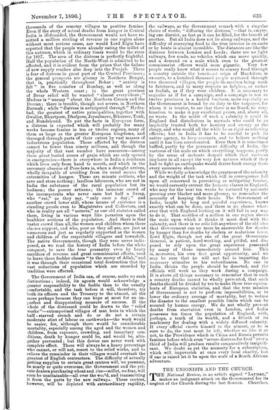THE APPROACHING FAMINE IN INDIA.
IT must be terrible work sometimes to be responsible for an Empire , the pleasant events, which are not unfrequent, do the Government so little 'good, while the calamities tax its energies and its resources so very sharply. We greatly fear that one of the latter kind of events is at hand, which could not have been averted, but which will inflict on all who are responsible great toil, great expendi- ture of energy, and greataneutel suffering. It is impossible to read the long, telegram of thin week from the Viceroy without perceiving that Lord Elgin and his advisers appre- hend that a .grave disaster is impending over India. The autumn rains_ have not in adequate quantity, and over an. ,enormous area of the pontinent there is a, prospect of severe distress, amounting, we fear, in thousands upon - - thousands of the remoter villages to positive famine. Even if the story of actual deaths from hunger in Central India is ill-founded, the Government would not have re- mitted a million sterling of revenue in one region alone without most serious cause, nor would Lord Elgin have reported that the people were already eating the millet of this autumn, which in ordinary times would be the store for 1897. The area of the distress is perfectly frightful. Half the population of the North-West is admitted to be affected, and it is evident from the prices that the failure of new supply reaches also deep into the Punjab. There is fear of distress in great part of the Central Provinces ; the general prospects are gloomy in Northern Bengal, that is, practically throughout Behar ; " anxiety is felt " in five counties of Bombay, as well as along the whole Western coast ; in the great province of Berar relief will be wanted "almost everywhere ; " Madras is "uneasy " about the Northern Circars and the Deccan ; there is trouble, though not severe, in Northern Burmah ; while "distress is anticipated through" Hydra- bad, the greatest of native principalities, together with Gwalior, Bhurtpore, Dholpore, Jeysulmere, Bikaneer, Tonk, and Bundelcund. To put the facts in European form, a distress is expected which will probably for many weeks become famine in ten or twelve regions, many of them as large as the greater European kingdoms, and thronged through parts of their extent by vast masses of industrious population. Those affected by the distress cannot be fewer than ninety millions, and though the majority of that vast number have resources—among them great buried stores of grain which are only opened in emergencies—there is everywhere in India a residuum which lives only from hand to mouth, and which in the necessary absence of Poor-laws is, when a drought arrives, wholly incapable of avoiding from its usual means the extremities of hunger. These are minute cottiers, who save and store nothing; landless labourers, who are not in India the substance of the rural population but its hodmen; the poorer artisans; the immense crowd of the incompetents who never earn but half a living, who "eat," as they say, "only once a day ; " and another crowd lower still, whose means of existence is a standing puzzle even to Magistrates and Collectors, and who in reality are all " sorners," as our old statutes called them, living in various ways like parasites upon the healthier sections of the population. And there is that vaster crowd than all, the women and children whom these classes support, and who, poor as they all are, are just as numerous and just as regularly supported as the women and children of the respectable villagers and townsfolk. The native Governments, though they were never indis- posed, as we read the history of India before the white conquest, to save the true peasantry even by heavy sacrifices of revenue and great commissariat efforts, used to leave these feebler classes "to the mercy of Allah," and it was through their occasional total destruction that the vast reductions of population which are recorded by tradition were effected.
The Government of India can, of course, make no such distinctions ; indeed, its agents would acknowledge a greater responsibility to the feeble than to the usually comfortable, and the task before it will, therefore, try both its officers and the Treasury to the utmost, all the more perhaps because they can hope at most for an im- perfect and disappointing measure of success. If the whole of the distressed could be drawn to the "relief works "—extemporised villages of mat huts in which the half - starved crouch and do or do not a certain moderate stint of labour on earthworks—the work would be easier, for, although there would be considerable mortality, especially among the aged and the women and children, from exposure, crowding, and insanitary con- ditions, death by hunger could be, and would be, alto- gether prevented ; but this device can never work with complete effect. There will always be a heavy percentage who cannot, or will not, resort to the relief works, and to relieve the remainder in their villages would overtask the greatest of English contractors. The difficulty of actually getting supplies to certain great centres will, we presume, be nearly or quite overcome, the Government and the pri- vate dealers purchasing wheat-and rice—millet, we fear, will soon be unattainable—all over the world, and transmitting it from the ports by the new railwaya. These centres, however, will be depleted with extraordinary rapidity,
the railways, as the Government remark with a singular choice of words, "diffusing the distress,"—that is, empty- ing one district, as fast as it can be filled, for the benefit of another. But all India does not lie along railways, and the difficulty of conveying food to the true interior in ox-carts or by boats is almost incredible. The distances are like the distance between London and Leeds ; there are no light railways, few roads, no vehicles which can move quickly, and a demand on a scale which even to the greatest commissariat officers would seem gigantic. Very few people really know what it means to convey food through a country outside the beneficent reign of MacAdani, in ox-carts, to a hundred thousand people scattered through two thousand villages, the people themselves being weak to faintness, and in many respects as helpless, or rather as foolish, as if they were children. It is necessary to organise as if for a campaign, and a campaign in ten or twelve provinces is a horrid business, more especially as the Government is bound by its duty to the taxpayer, for whom it is trustee, to see that there is no fraud, no com- bination to make it pay exorbitant prices, and, above all, no waste. In the midst of such a calamity it could in England find distributors in myriads who could be as implicitly trusted both for honesty and energy as the clergy, and who would all the while be as rigid as relieving officers ; but in India it has to be careful to pick its native agency, to keep accounts, and to believe nothing until it has been corroborated. Even then it is sometimes baffled, partly by the permanent difficulty of India, the vastness of the scale on which everything happens, partly by the sense of inchoate despair which that vastness implants in all except the very few natures which if they had to fight an earthquake would derive fresh energy from every successive shock.
While we fully acknowledge the greatness of the calamity and the weight of the task which will in consequence fall upon all concerned in preventing or mitigating famine, we would earnestly entreat the humane classes in England, who may for the next ten weeks be tortured by accounts growing ever blacker and more gloomy, to remember the necessity of keeping their heads. The Government of India, taught by long and painful experience, knows exactly what can be done, and there is no chance what- ever that with England looking on it will fail in any way to do it. That sacrifice of a million in one region shows the scale upon which it thinks it must deal with the calamity, and there is no relic left anywhere of the old idea that Government can no more be answerable for deaths by hunger than for deaths by cholera or malarious fever. Lord Elgin, though not one of the great Governors- General, is patient, hard-working, and pitiful, and dis- posed to rely upon the great experience possessed by many of those immediately around him. This is, moreover, his own first great opportunity, and we may be sure that he will not fail in imparting the necessary stimulus to his subordinates. No one in India thinks the people should be deserted, and the officials will work as they work during a campaign. It is above all things necessary to remember that in such a country deaths cannot be wholly prevented, that such deaths should be divided by ten to make them true equiva- lents of European statistics, and that the true mission of Government is not to perform impossibilities, or to lower the ordinary average of mortality, but to reduce the disaster to the smallest possible limits which can be secured by human energy. We do not wholly prevent deaths from starvation even in London, and India possesses ten times the population of England, with, perhaps, a tenth of its wealth, and a fiftieth of its machinery for dealing with a widely diffused calamity. If every official exerts himself to the utmost, as he is sure to do, the rest must be left, whether we like it or not, to the Providence which in China and Russia permits famines before which even "severe distress for food" over a third of India will produce results comparatively ineignill- cant. We doubt as yet the necessity for a subscription, which will impoverish at once every local charity, but if one is raised let it be upon the scale of a South African adventure.



















































 Previous page
Previous page